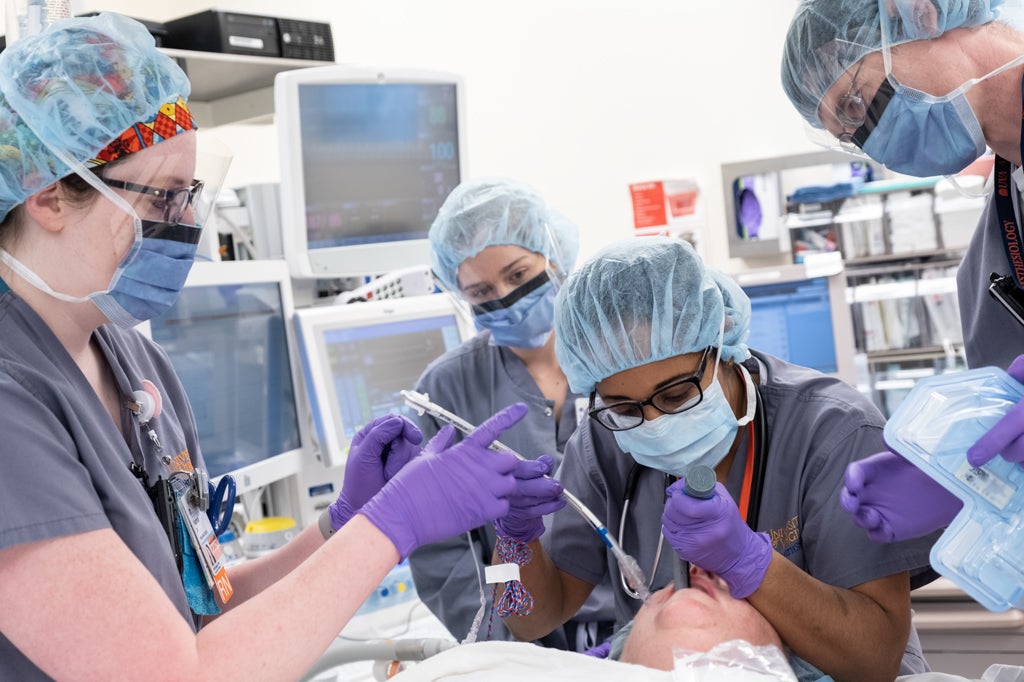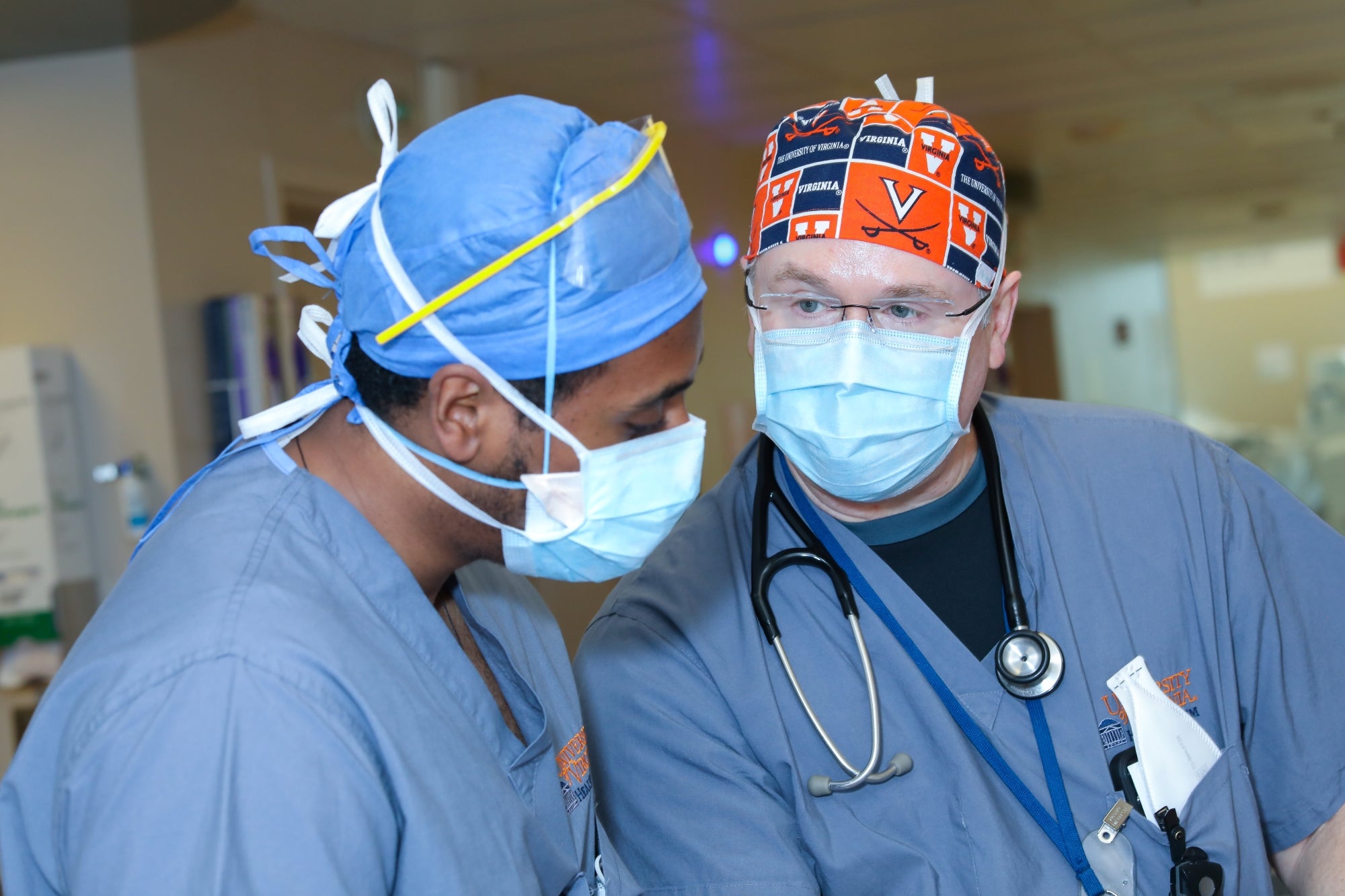Resident Rotations

UVA Anesthesiology Residents perform an intubation on a patient.
About
As specified by the American Board of Anesthesiology, Resident rotations are generally scheduled in blocks to facilitate learning. During the CA-0, 1, and 2 years, resident rotations are typically scheduled in 4 week blocks to facilitate learning and as specified by the ABA. Rotations for the CA-3 year are scheduled in smaller 1-2 week blocks to help residents prepare for the variability encountered in any anesthesia practice setting. All rotations take place at the University of Virginia Medical Center with the exception of an elective OB rotation in Fairfax, VA during the CA-3 year.
Our CA3 residents have anywhere from 24-26 weeks of elective time during their final year of training and have some flexibility in choosing these electives to best suit their future career goals. Many of our residents also take advantage of international opportunities during the CA-3 year, using elective time, to include work in Rwanda, Bolivia, India, Laos, and Malawi.
All residents receive 4 weeks of vacation per year in addition to interview time.
Anesthesia Rotations
Anesthesia Resident Yearly Schedule
| General Anesthesiology (Main OR) | 5 months |
| Emergency medicine | 1 month |
| Internal medicine (Inpatient) | 1 month |
| Pain medicine clinic (Ambulatory) | 1 month |
| Cardiac surgery (Inpatient) | 1 month |
| General surgery (Inpatient) | 1 month |
| Cardiology (Inpatient) | 1 month |
| Pediatrics (Inpatient) | 1 month |
| General Anesthesiology (Main OR) | 6-8 weeks |
| Cardiac anesthesia | 4 weeks |
| Neuro anesthesia | 4 weeks |
| Pediatric anesthesia | 4 weeks |
| Obstetric anesthesia | 4 weeks |
| Main OR nights | 2 weeks |
| Acute pain service | 2 weeks |
| Post-anesthesia care unit (PACU) | 2 weeks |
| Anesthesiology pre-op clinic (PETC) | 4 weeks |
| Pediatric ICU | 4 weeks |
| Cardiac ICU (TCV-PO) | 4 weeks |
| Cardiology consults | 3 weeks |
| Pulmonology consults | 3 weeks |
| General Anesthesiology (Main OR) | 24-26 weeks |
| Neuro anesthesia | 4 weeks |
| Pediatric anesthesia | 4 weeks |
| Obstetric anesthesia | 4 weeks |
| Main OR nights | 2 weeks |
| Acute pain service | 2 weeks |
| Post-anesthesia care unit (PACU) | 2 weeks |
| Anesthesiology pre-op clinic (PETC) | 4 weeks |
| Medical ICU | 4 weeks |
| Anesthesiology (Main OR) | 6-8 weeks |
| Cardiac anesthesia | 4 weeks |
| Thoracic anesthesia | 2 weeks |
| Vascular anesthesia | 2 weeks |
| TEE | 2 weeks |
| Neuro anesthesia | 4 weeks |
| Pediatric anesthesia | 4 weeks |
| Obstetric anesthesia | 4 weeks |
| Main OR nights | 2 weeks |
| Ambulatory anesthesia | 4 weeks |
| Regional anesthesia | 3 weeks |
| Acute pain service | 2 weeks |
| Pain medicine clinic | 4 weeks |
| Neuro ICU | 4 weeks |
| Surgical ICU | 4 weeks |
| Cardiac anesthesia | 6 weeks |
| Thoracic anesthesia | 2 weeks |
| Neuro anesthesia | 4 weeks |
| Pediatric anesthesia | 4 weeks |
| Pediatric cardiac anesthesia | 3 weeks |
| Obstetric anesthesia (at UVA) | 2 weeks |
| Late shift | 3 weeks |
| Post-anesthesia care unit (PACU) | 1 week |
| Main OR Nights | 2 weeks |
| Electives | ~25 weeks |
Scheduling Details
The call system at UVA is designed to distribute work hours equitably among residents. Each weekday six residents, numbered 1st through 6th, take call in the main operating room. The call residents are dismissed in descending order from 6th to 1st as the ORs finish and close for the day. IT is rare for 1-6 residents to be called back once relieved to go home. We typically have 1-2 late shift residents (1-9 pm ; 3-11 pm) as well as incentivized evening shifts (e.g. 5-9 pm) for interested residents. These shifts (or opportunities) enable non-call (and call) residents to be relieved earlier.
Our night float system consists of 2 residents who begin their work at 5:30PM and finish the next morning at 7AM (Saturday night through Friday morning, with a protected weekend off Friday 0700 through Monday 0700). Numbered call residents and night float residents are responsible to start evening and emergent cases and relieve residents and CRNAs not on call. In the outpatient center, there is a designated ‘first out’ resident and a ‘late resident’ to prioritize schedule consistency and equity.
In the main operating room, the 2nd call resident (unlike the other numbered call residents) is not scheduled in a room and is responsible for seeing consults within the hospital. These are inpatient cases posted to the OR after the previous day’s schedule has been completed. This call resident also responds to hospital-wide codes and assists when called up for floor or ICU intubations.
As a general guide, the time at which the call resident leaves can typically be calculated by subtracting their call number from midnight. For example, 6th call may leave around 18:00 (midnight minus 6) and 3rd call may leave around 21:00 (midnight minus 3). Residents are on call until 0700 the following morning and if needed, they are called back in ascending order (1st, then 2nd, then 3rd, etc). It is generally rare for 3rd through 6th call to be called again once sent home. The 1st, 2nd, and 3rd call residents have various post-call privileges the following day.
Most of our residents work one weekend per month while on a main OR rotation. There are two “day-late” residents and two night residents. Weekend call works such that call is typically 1/3 residents (Sat/Sun) or 2/2 at/Sun) with post-call with post-call privileges on Monday. The day-late residents work from 07:00 to 17:30 when the night team comes to relieve them. One resident is scheduled as 1st/2nd call while another is 2nd/1st call on Saturday/Sunday respectively. Another resident is scheduled as 3rd call both Saturday and Sunday. Similar to weekdays, the 1st, 2nd, and 3rd call residents have various post-call privileges on Monday.
All residents require and deserve time to address personal appointments during their resident career. Having the flexibility to attend doctors/dentist appointments, family emergencies, medical leave, etc. are considered important by the residency program leadership at UVA. Through the use of post-call privileges and communication with our chief residents/attending board runners (who manage scheduling for our Main Operating Rooms), residents often have flexibility to attend these important matters. All residents receive 4 weeks of vacation per year in addition to interview time.

Dr. Ryan Lesh teaching in the ORs
